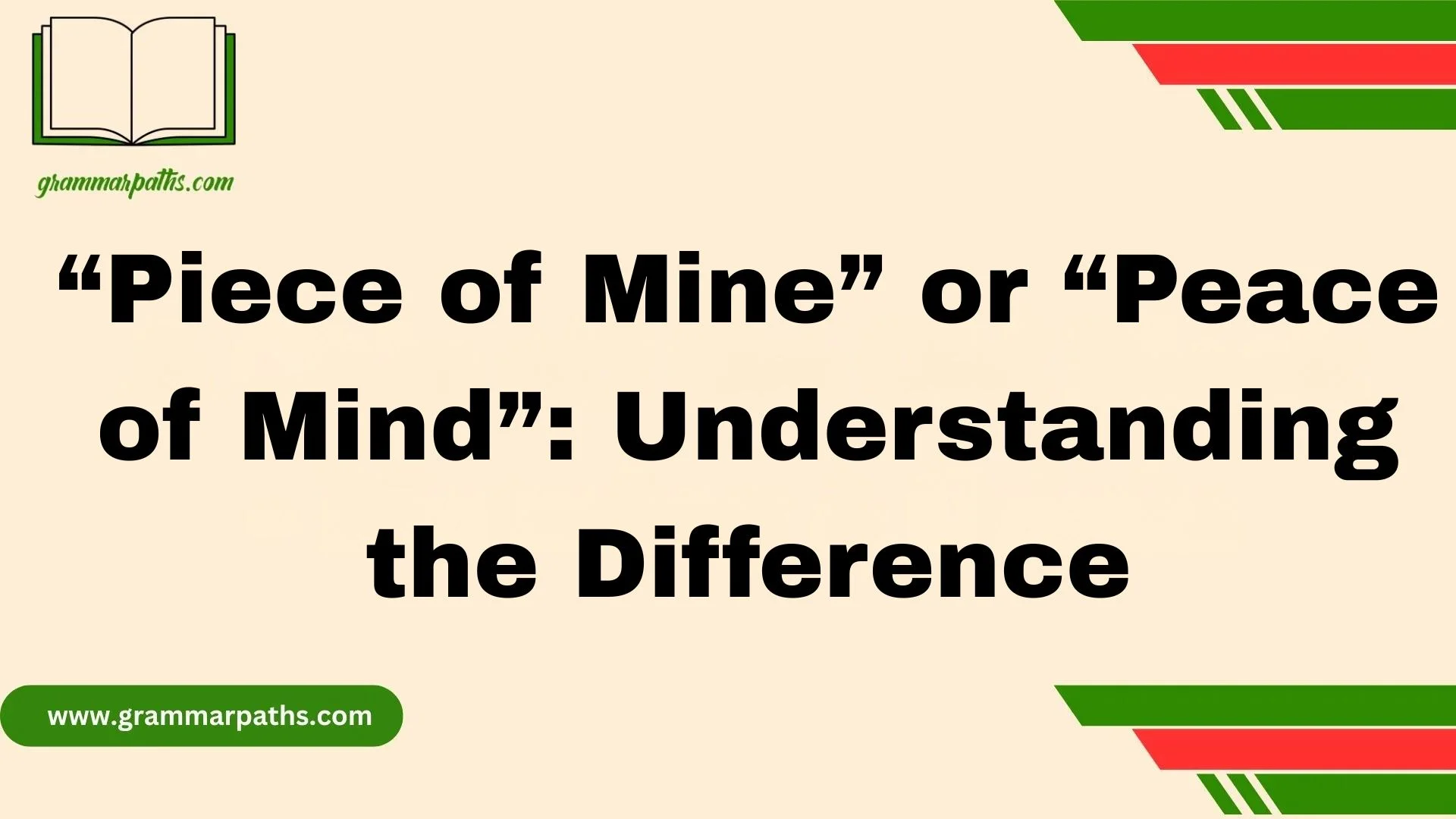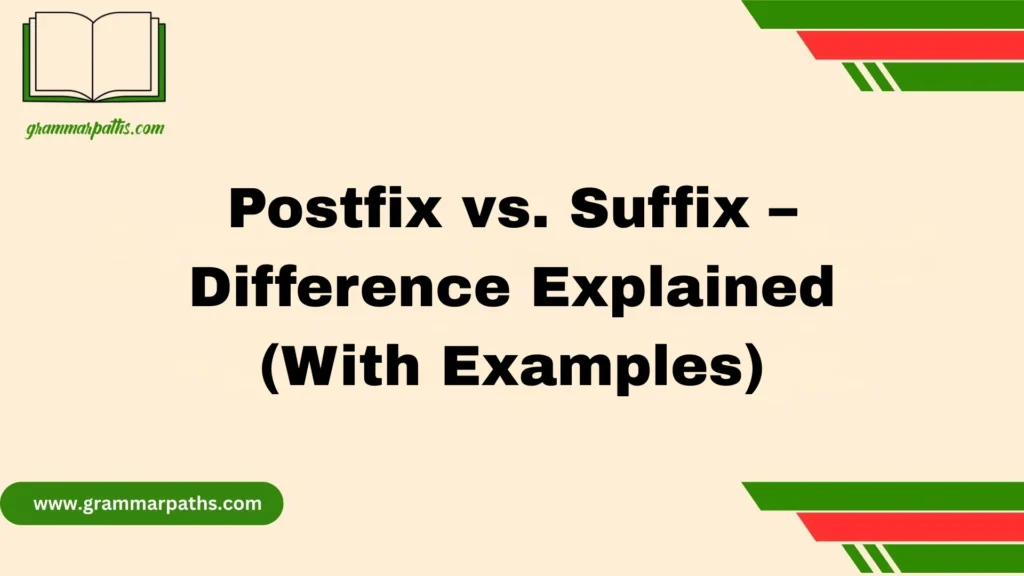In my years as a language enthusiast, I’ve often seen people confuse the phrases piece of mine and peace of mind. “Piece of Mine” or “Peace of Mind”: Understanding the Difference perfectly sums up how a small change in spelling or pronunciation can alter the meaning of a phrase entirely. In everyday conversation, one might think they’re offering comfort, assurance, or clarity, but the wrong term could convey an unintended idea. While peace of mind expresses calm, security, and tranquillity, piece of mine leans toward possession or ownership. The cultural and literary origins of such homophones add an extra layer of significance, making it important to choose words carefully to convey the message you intend.
When I first heard someone use piece of mine instead of peace of mind, it was during a conversation about life decisions. They wanted to sound confident, but the expression came across as if they were talking about ownership, not emotional calm. That moment showed me why we must avoid this common confusion. Similar sounding words are often misheard, and context is key to understanding the correct usage. By knowing the difference, you can keep your speech precise, your communication clear, and your intent easy to interpret.
Why These Phrases Are So Often Confused
English is full of homophones—words that sound alike but have different meanings and spellings. In spoken conversation, the difference between peace and piece disappears entirely, leaving context to carry the meaning. But in writing, mixing them up can lead to misunderstandings or make you look careless.
In the United States, this confusion appears everywhere: in social media posts, product reviews, advertising campaigns, and even headlines. A quick search of online marketplaces will reveal sellers promising “piece of mine” instead of “peace of mind” when describing warranties or guarantees.
This article clears up that confusion by showing:
- The correct meanings and uses of “peace of mind” and “a piece of your mind.”
- Why “piece of mine” doesn’t make sense in standard English.
- How these phrases evolved historically and culturally in America.
- Memorable tricks for avoiding mistakes.
Peace of Mind – Meaning and Everyday Usage
Definition: Peace of mind refers to a state of emotional calm, security, and reassurance. It’s the feeling that comes when you know something is taken care of and you no longer have to worry about it.
Examples in American life:
- A parent feels peace of mind when their child arrives home safely from school.
- A homeowner feels it after installing a reliable alarm system.
- A traveler feels it when they purchase travel insurance before an international trip.
Synonyms and related expressions:
- Reassurance – “Her doctor’s report gave her reassurance.”
- Security – “This contract provides security for the next five years.”
- Relief – “Knowing the loan was paid off was a relief.”
Where you’ll see it in the US:
- Insurance ads often use “peace of mind” to promise customers safety and reliability.
- Real estate listings highlight secure neighborhoods to give potential buyers peace of mind.
- Healthcare providers market preventative checkups as offering peace of mind.
- Quote: “Peace of mind comes not from the absence of trouble, but from the presence of trust.” – Anonymous
A Piece of Your Mind – Meaning and Tone
Definition: A piece of your mind means to speak bluntly, often to criticize or show disapproval. It carries an emotional punch and is generally more confrontational than casual.
Examples in daily American speech:
- “The customer gave the restaurant manager a piece of her mind about the slow service.”
- “After hearing the unfair remarks, he decided to give them a piece of his mind.”
Synonyms and related idioms:
- Tell off – “She told off her co-worker for being late again.”
- Set straight – “The coach set the players straight after the loss.”
- Speak one’s mind – Similar but less confrontational.
Common settings:
- Workplace disputes.
- Political debates or rallies.
- Sports commentary.
Why “Piece of Mine” Is Incorrect
While it’s tempting to think mine could stand in for mind, the two have very different meanings. Mine refers to something that belongs to you or an excavation in the earth. In “piece of mine,” neither meaning makes sense in context.
Why it’s wrong:
- Grammatically, “piece of mine” means “a part of my possession,” which does not convey calm or criticism.
- Semantically, it confuses readers and distracts from your intended message.
Common causes of the error:
- Speech-to-text technology mishearing “mind” as “mine.”
- Autocorrect replacing unfamiliar phrases.
- Hearing the phrase but never seeing it written.
Historical and Linguistic Origins
Etymology of Peace of Mind
- Peace comes from the Latin pax, meaning freedom from civil disorder.
- The phrase appears in English literature as early as the 16th century.
- It gained popularity in the United States in the early 1900s, often linked to financial stability and home life.
Etymology of A Piece of Your Mind
- Likely of British origin, with appearances in the late 1700s.
- Entered American newspapers by the mid-1800s as a colorful idiom.
- Over time, its tone shifted from earnest to confrontational.
Why They Get Confused
- Peace and piece are near-perfect homophones.
- American English often drops precise enunciation in casual conversation, making the words indistinguishable by sound.
Real-Life Usage in the United States
Peace of Mind
- Homeowners rely on secure locks and alarm systems.
- Parents feel relief when children’s schools have strict safety protocols.
- Travelers use trip insurance to protect against unexpected costs.
A Piece of Your Mind
- Sports fans often “give a piece of their mind” to referees.
- Customers write strong Yelp reviews after bad service.
- Employees confront management about unfair treatment.
Misuse in Media
- Amazon product listings promising “piece of mine warranty.”
- Social media posts where users mean “peace” but type “piece.”
- Marketing campaigns where spellcheck failed to catch the error.
Peace of Mind in American Pop Culture
Television and Film
- Sitcom characters often use “peace of mind” to explain why they made a decision.
- Drama series use it to justify sacrifices for loved ones.
Music
- Boston’s 1976 hit “Peace of Mind” became a classic rock anthem about personal freedom and not chasing material success.
- Country music often uses the phrase in songs about love and home.
- R&B artists employ it metaphorically to describe emotional stability.
Literature and Speeches
- Appears in self-help books about stress management.
- Used in US presidential speeches to reassure citizens in times of crisis.
Psychological and Cultural Significance
Peace of Mind
- Americans value personal safety and financial stability, both key to emotional calm.
- Increasing mental health awareness has made the phrase more relevant in recent years.
A Piece of Your Mind
- Reflects the American cultural emphasis on directness and honesty.
- While sometimes seen as aggressive, it’s also linked to assertiveness.
How to Avoid the “Piece of Mine” Mistake
Grammar Checkpoints
- Peace = calm, Piece = part.
- Ask: “Am I talking about calm or about a portion of something?”
Memory Aids
- Visualize a dove for “peace.”
- Picture a slice of pie for “piece.”
Digital Tools
- Enable grammar check in word processors.
- Use browser extensions like Grammarly to catch errors in real time.
Quick Reference Table: Piece vs Peace
| Phrase | Correct? | Meaning | Example Sentence |
| Peace of Mind | ✅ Yes | Calm, security | “A savings account gives me peace of mind.” |
| A Piece of Your Mind | ✅ Yes | Expressing strong opinion | “He gave the contractor a piece of his mind.” |
| Piece of Mine | ❌ No | Incorrect | N/A |
Conclusion
Language is powerful, and small changes in wording can make a big difference in meaning. In American English, “peace of mind” and “a piece of your mind” are two completely different expressions, each with its own emotional weight and social context.
Peace of mind is about calm, security, and reassurance—things Americans value highly in personal life, business, and relationships. A piece of your mind is about assertiveness, confrontation, and honesty—traits that are also part of the American communication style.
The incorrect “piece of mine” doesn’t work in any professional or casual setting. It’s a grammatical error that can weaken credibility in writing and speech.
By understanding the history, usage, and cultural significance of these phrases, you can communicate more clearly, avoid embarrassing mistakes, and present yourself with confidence. In a country that values both clarity and personality in expression, getting these phrases right gives you a real linguistic advantage.
FAQs: “Piece of Mine” vs “Peace of Mind”
Q1: Is “piece of mine” ever correct?
No. “Piece of mine” is not correct in standard American English. While it could appear in a literal sense (“This pie is a piece of mine”), it doesn’t replace “peace of mind” or “a piece of your mind” in idiomatic usage.
Q2: What does “peace of mind” mean?
It means a state of mental and emotional calmness, free from worry. Americans often use it when referring to safety, security, or reassurance—like knowing your home is locked or your finances are secure.
Q3: What does “a piece of your mind” mean?
It means speaking frankly, usually in a critical or confrontational way. For example, telling a company exactly why their service disappointed you.
Q4: Why do people confuse these phrases?
They sound almost identical when spoken, making them homophones. Without seeing them in writing, it’s easy to mix them up—especially in casual conversation or on social media.
Q5: How can I remember the difference?
- Peace = calm, security → peace of mind
- Piece = part of something → a piece of your mind
Visual memory aids, like imagining a dove for “peace” or a slice of pie for “piece,” can help.

Emma Brooke is a passionate language expert and contributor at GrammarPaths.com, where she helps learners navigate the complexities of English grammar, idioms, and effective writing. With a strong academic background and years of teaching experience, Emma excels at turning tricky grammar rules into simple, practical lessons that readers can easily grasp.










